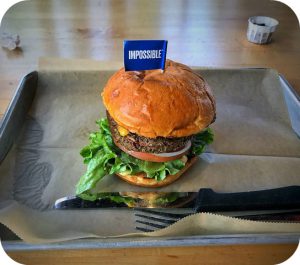 Nearly four years ago, we published a blog post centered on companies like Impossible Foods and Beyond Meat who claimed to be creating the future of food. Both of these startups developed plant-based alternatives to meat that looked and tasted similar to the real thing, an idea which seemed straight out of science fiction at the time. Fast forward to 2019, though, and now consumers can purchase Beyond Meat’s burger patties at any Whole Foods location that manages to keep them in stock.
Nearly four years ago, we published a blog post centered on companies like Impossible Foods and Beyond Meat who claimed to be creating the future of food. Both of these startups developed plant-based alternatives to meat that looked and tasted similar to the real thing, an idea which seemed straight out of science fiction at the time. Fast forward to 2019, though, and now consumers can purchase Beyond Meat’s burger patties at any Whole Foods location that manages to keep them in stock.
Sales of the patties increased 23 percent from 2017 to 2018 as the grocery chain struggled to keep up with demand. In fact, Beyond Meat had to postpone its expansion into U.K. stores due to a lack of supply, leading it to triple its production capacity last year. American eaters can also purchase an Impossible Burger at more than 5,000 restaurants across the country, included fast food chains like White Castle. Analysts credit the growing success of these plant-based proteins to marketing campaigns that target meat eaters rather than strictly vegetarians. “It’s a real shift in the meat alternative category from what it had been for decades, where most of the products were designed mostly for vegetarian and vegan audiences and weren’t trying to directly replicate conventional meat,” said Caroline Bushnell, an industry expert who works at the nonprofit Good Food Institute.
Plus, newcomers like Good Catch and No Evil Foods are bringing non-burger offerings to the plant-based meat market. While Good Catch will launch in February with a line of fishless tuna and crabless crab cakes, No Evil already sells its pig-free pulled pork at Walmart. Of course, this growing industry is still very much in its infancy: current sales of plant-based alternatives account for less than 1 percent of total retail meat sales. But experts say that alternative foods such as soy milk or organic vegetables were at a similar point ten years ago. Those products soon expanded outside of their niche, and it’s likely that plant-based meats will do the same. “I think an interesting parallel can be made to the natural and organic space,” said Bushnell. “For many years, I think a lot of big companies thought that was going to stay kind of niche, and left it to the smaller companies that were catering to those natural and organic consumers. And then very quickly that changed.”
Questions:
- Why do companies like Beyond Meat and Impossible Foods market their products to meat eaters rather than focus strictly on vegetarians?
- Which stage of the product life cycle are plant-based meats currently at?
Source: Adele Peters, “2019 Will Be the Year Alt-Meat Goes Mainstream,” Fast Company, December 26, 2018. Photo by T.Tseng.
